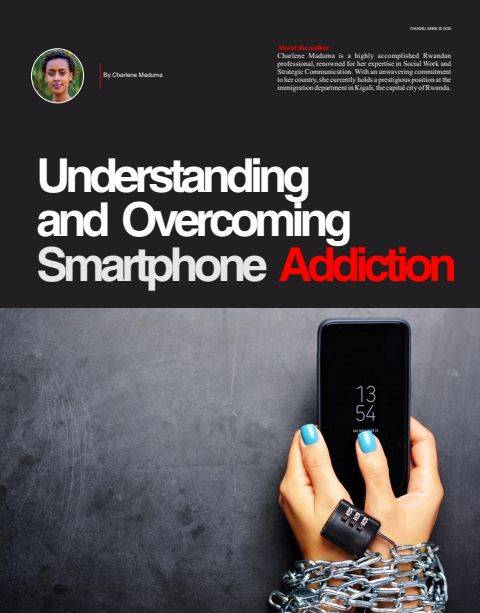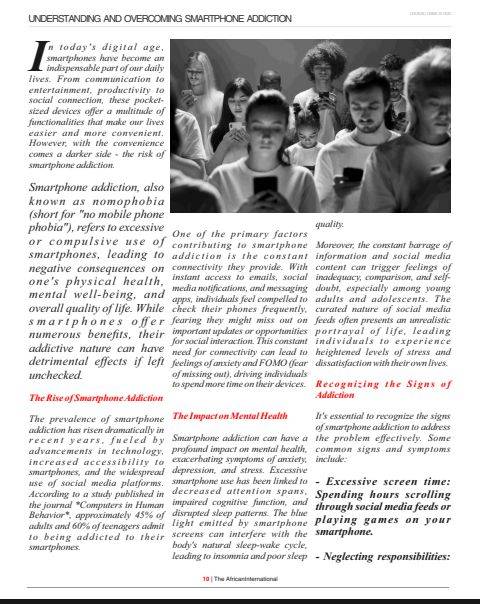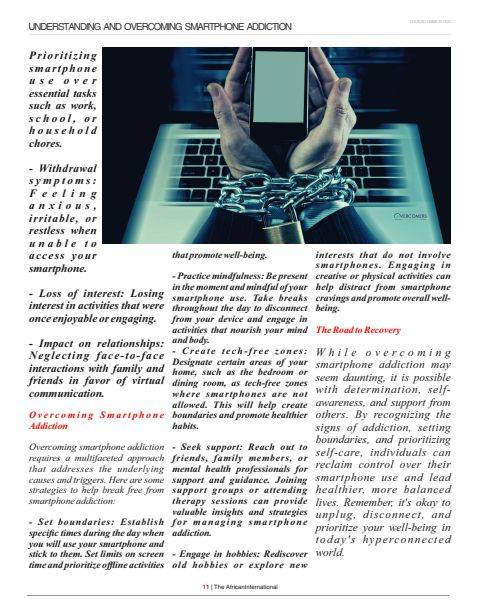By Charlene Maduma

In today’s digital age, smartphones have become an indispensable part of our daily lives. From communication to entertainment, productivity to social connection, these pocket-sized devices offer a multitude of functionalities that make our lives easier and more convenient. However, with the convenience comes a darker side – the risk of smartphone addiction.
Smartphone addiction, also known as nomophobia (short for “no mobile phone phobia”), refers to excessive or compulsive use of smartphones, leading to negative consequences on one’s physical health, mental well-being, and overall quality of life. While smartphones offer numerous benefits, their addictive nature can have detrimental effects if left unchecked.
The Rise of Smartphone Addiction
The prevalence of smartphone addiction has risen dramatically in recent years, fueled by advancements in technology, increased accessibility to smartphones, and the widespread use of social media platforms. According to a study published in the journal *Computers in Human Behavior*, approximately 45% of adults and 60% of teenagers admit to being addicted to their smartphones.
One of the primary factors contributing to smartphone addiction is the constant connectivity they provide. With instant access to emails, social media notifications, and messaging apps, individuals feel compelled to check their phones frequently, fearing they might miss out on important updates or opportunities for social interaction. This constant need for connectivity can lead to feelings of anxiety and FOMO (fear of missing out), driving individuals to spend more time on their devices.
The Impact on Mental Health
Smartphone addiction can have a profound impact on mental health, exacerbating symptoms of anxiety, depression, and stress. Excessive smartphone use has been linked to decreased attention spans, impaired cognitive function, and disrupted sleep patterns. The blue light emitted by smartphone screens can interfere with the body’s natural sleep-wake cycle, leading to insomnia and poor sleep quality.
Moreover, the constant barrage of information and social media content can trigger feelings of inadequacy, comparison, and self-doubt, especially among young adults and adolescents. The curated nature of social media feeds often presents an unrealistic portrayal of life, leading individuals to experience heightened levels of stress and dissatisfaction with their own lives.

Recognizing the Signs of Addiction
It’s essential to recognize the signs of smartphone addiction to address the problem effectively. Some common signs and symptoms include:
– Excessive screen time: Spending hours scrolling through social media feeds or playing games on your smartphone.
– Neglecting responsibilities: Prioritizing smartphone use over essential tasks such as work, school, or household chores.
– Withdrawal symptoms: Feeling anxious, irritable, or restless when unable to access your smartphone.
– Loss of interest: Losing interest in activities that were once enjoyable or engaging.
– Impact on relationships: Neglecting face-to-face interactions with family and friends in favor of virtual communication.

Overcoming Smartphone Addiction
Overcoming smartphone addiction requires a multifaceted approach that addresses the underlying causes and triggers. Here are some strategies to help break free from smartphone addiction:
– Set boundaries: Establish specific times during the day when you will use your smartphone and stick to them. Set limits on screen time and prioritize offline activities that promote well-being.
– Practice mindfulness: Be present in the moment and mindful of your smartphone use. Take breaks throughout the day to disconnect from your device and engage in activities that nourish your mind and body.
– Create tech-free zones: Designate certain areas of your home, such as the bedroom or dining room, as tech-free zones where smartphones are not allowed. This will help create boundaries and promote healthier habits.
– Seek support: Reach out to friends, family members, or mental health professionals for support and guidance. Joining support groups or attending therapy sessions can provide valuable insights and strategies for managing smartphone addiction.
– Engage in hobbies: Rediscover old hobbies or explore new interests that do not involve smartphones. Engaging in creative or physical activities can help distract from smartphone cravings and promote overall well-being.
The Road to Recovery
While overcoming smartphone addiction may seem daunting, it is possible with determination, self-awareness, and support from others. By recognizing the signs of addiction, setting boundaries, and prioritizing self-care, individuals can reclaim control over their smartphone use and lead healthier, more balanced lives. Remember, it’s okay to unplug, disconnect, and prioritize your well-being in today’s hyperconnected world.

